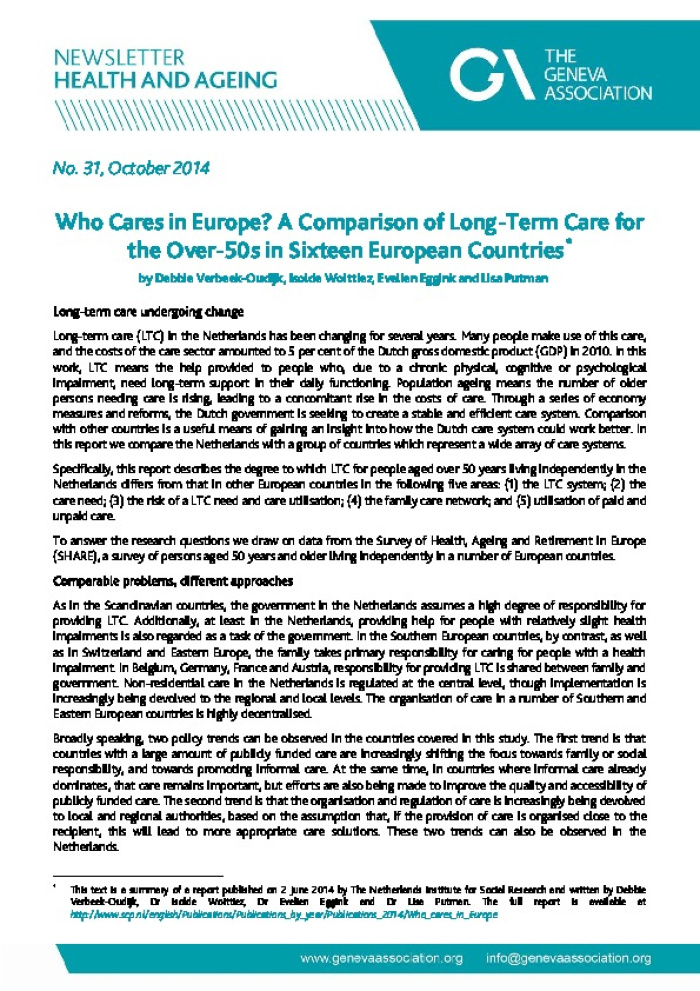Who Cares in Europe? A Comparison of Long-Term Care for the Over-50s in Sixteen European Countries
Health & Ageing Newsletter 31: Debbie Verbeek-Oudijk et al. describe the degree to which long-term care for people aged over 50 years living independently in the Netherlands differs from that in other European countries.

No. 31, October 2014 Who Cares in Europe? A Comparison of Long-Term Care for the Over -50s in Sixteen European Countries * by Debbie Verbeek-Oudijk, Isolde Woittiez, Evelien Eggink and Lisa Putman Long-term care undergoing change Long-term care (LTC) in the Netherlands has been changing for several years. Many people make use of this care, and the costs of the care sector amounted to 5 per cent of the Dutch gross domestic product (GDP) in 2010. In this work, LTC means the help prov ided to people who, due to a chronic physical, cognitive or psychological impairment, need long -term support in their daily functioning. Population ageing means the number of older persons needing care is rising, leading to a concomitant rise in the costs of care. Through a series of economy measures and reforms, the Dutch government is seeking to create a stable and efficient care system. Comparison with other countries is a useful means of gaining an insight into how the Dutch care system could work bette r. In this report we compare the Netherlands with a group of countries which represent a wide array of care systems. Specifically, this report describes the degree to which LTC for people aged over 50 years living independently in the Netherlands differs from that in other European countries in the following five areas: (1) the LTC system; (2) the care need; (3) the risk of a LTC need and care utilisation; (4) the family care network; and (5) utilisation of paid and unpaid care. To answer the research ques tions we draw on data from the Survey of Health, Ageing and Retirement in Europe (SHARE), a survey of persons aged 50 years and older living independently in a number of European countries. Comparable problems, different approaches As in the Scandinavian countries, the government in the Netherlands assumes a high degree of responsibility for providing LTC. Additionally, at least in the Netherlands, providing help for people with relatively slight health impairments is also regarded as a task of the government. In the Southern European countries, by contrast, as well as in Switzerland and Eastern Europe, the family takes primary responsibility for caring for people with a health impairment. In Belgium, Germany, France and Austria, responsibility for providing LTC is shared between family and government. Non- residential care in the Netherlands is regulated at the central level, though implementation is increasingly being devolved to the regional and local levels. The organisation of care in a number of Southern and Eastern European countries is highly decentralised. Broadly speaking, two policy trends can be observed in the countries covered in this study. The first trend is that countries with a large amount of publicly funded care are i ncreasingly shifting the focus towards family or social responsibility, and towards promoting informal care. At the same time, in countries where informal care already dominates, that care remains important, but efforts are also being made to improve the q uality and accessibility of publicly funded care. The second trend is that the organisation and regulation of care is increasingly being devolved to local and regional authorities, based on the assumption that , if the provision of care is organised close t o the recipient, this will lead to more appropriate care solutions. These two trends can also be observed in the Netherlands. * This text is a summary of a report published on 2 June 2014 by The Netherland s Institute for Social Research and written by Debbie Verbeek -Oudijk, Dr Isolde Woittiez, Dr Evelien Eggink and Dr Lisa Putman. The full report is available at http://www.scp.nl/english/Publications/Publications_by_year/Publications...